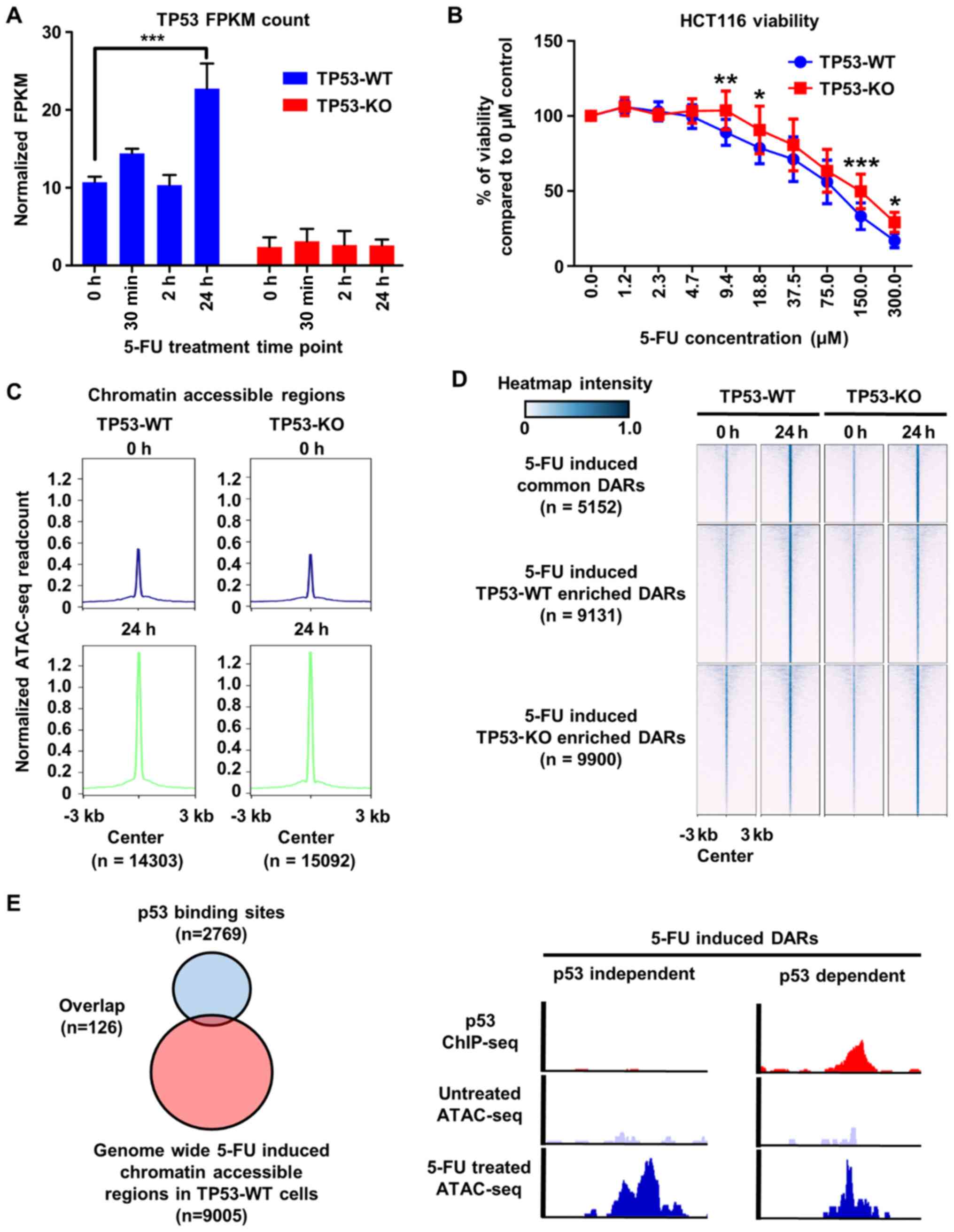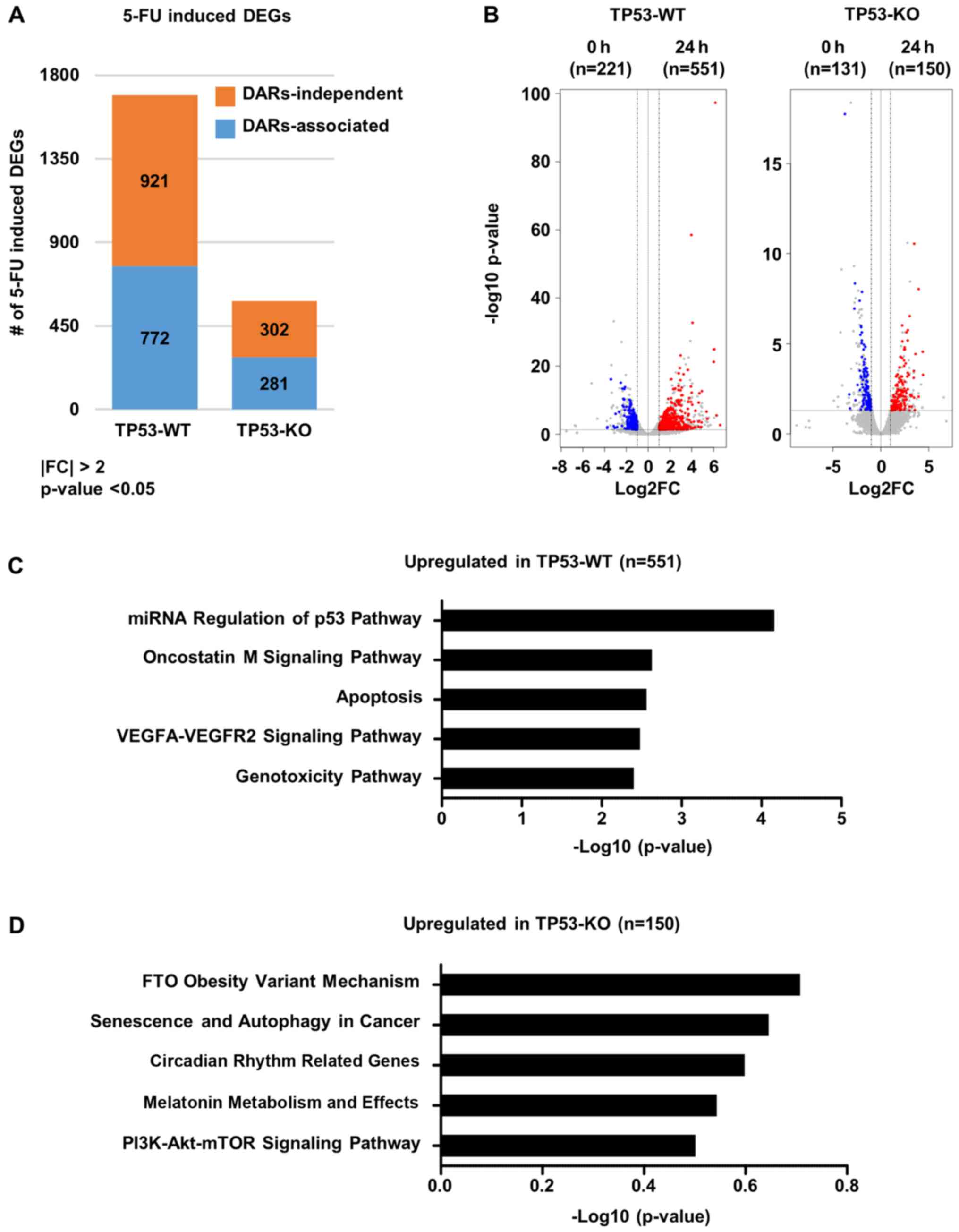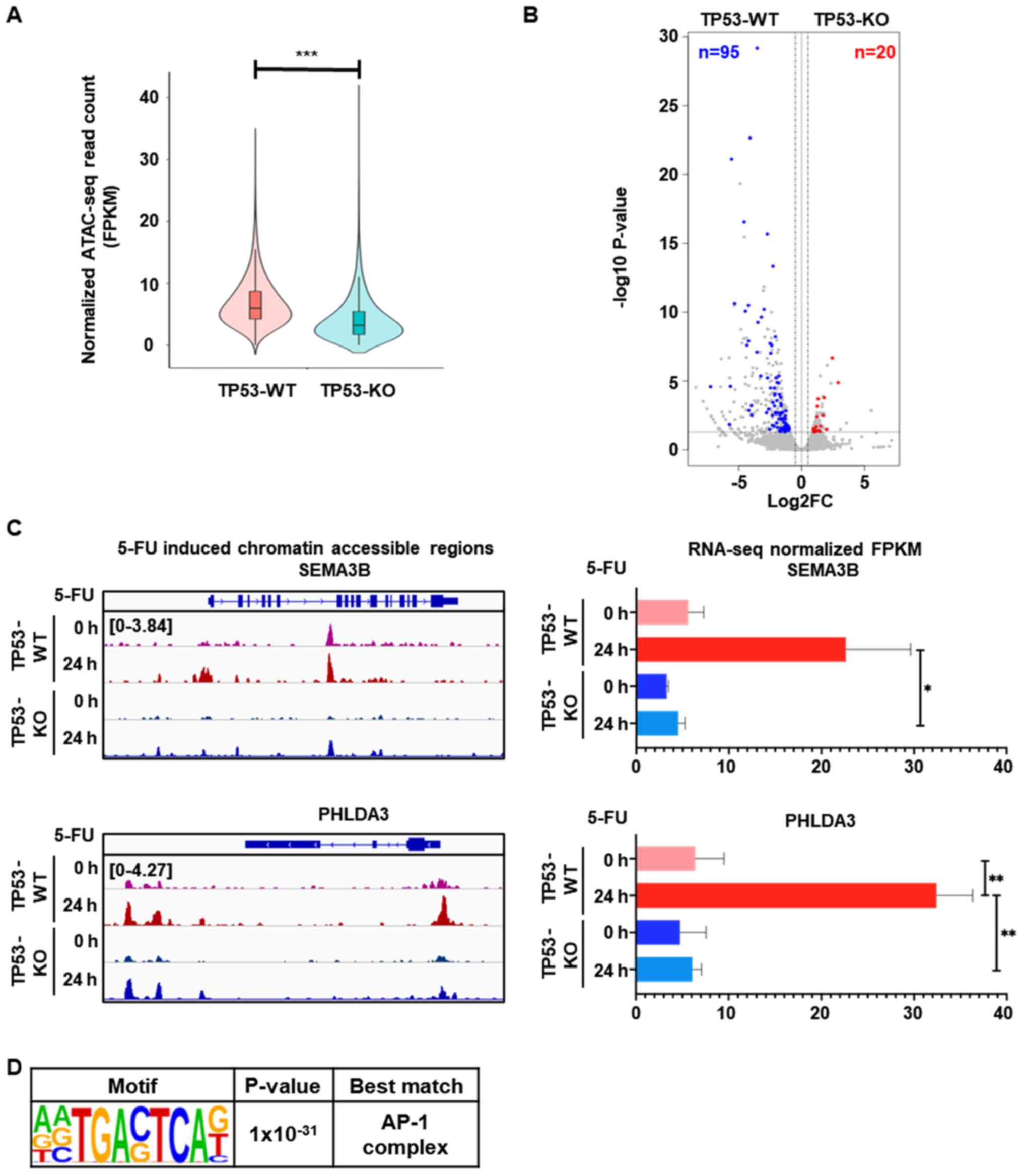|
1
|
Diasio RB and Harris BE: Clinical
pharmacology of 5-fluorouracil. Clin Pharmacokinet. 16:215–237.
1989. View Article : Google Scholar : PubMed/NCBI
|
|
2
|
Jordan VC: A Retrospective: On clinical
studies with 5-fluorouracil. Cancer Res. 76:767–768. 2016.
View Article : Google Scholar : PubMed/NCBI
|
|
3
|
Zhang N, Yin Y, Xu SJ and Chen WS:
5-Fluorouracil: Mechanisms of resistance and reversal strategies.
Molecules. 13:1551–1569. 2008. View Article : Google Scholar : PubMed/NCBI
|
|
4
|
Russo A, Bazan V, Iacopetta B, Kerr D,
Soussi T and Gebbia N; TP53-CRC Collaborative Study Group, : The
TP53 colorectal cancer international collaborative study on the
prognostic and predictive significance of p53 mutation: Influence
of tumor site, type of mutation, and adjuvant treatment. J Clin
Oncol. 23:7518–7528. 2005. View Article : Google Scholar : PubMed/NCBI
|
|
5
|
Giovannetti E, Backus HH, Wouters D,
Ferreira CG, van Houten VM, Brakenhoff RH, Poupon MF, Azzarello A,
Pinedo HM and Peters GJ: Changes in the status of p53 affect drug
sensitivity to thymidylate synthase (TS) inhibitors by altering TS
levels. Br J Cancer. 96:769–775. 2007. View Article : Google Scholar : PubMed/NCBI
|
|
6
|
Dominijanni A and Gmeiner WH: Improved
potency of F10 relative to 5-fluorouracil in colorectal cancer
cells with p53 mutations. Cancer Drug Resist. 1:48–58. 2018.
View Article : Google Scholar : PubMed/NCBI
|
|
7
|
Moll UM, Marchenko N and Zhang XK: p53 and
Nur77/TR3-transcription factors that directly target mitochondria
for cell death induction. Oncogene. 25:4725–4743. 2006. View Article : Google Scholar : PubMed/NCBI
|
|
8
|
Leu JI, Dumont P, Hafey M, Murphy ME and
George DL: Mitochondrial p53 activates Bak and causes disruption of
a Bak-Mcl1 complex. Nat Cell Biol. 6:443–450. 2004. View Article : Google Scholar : PubMed/NCBI
|
|
9
|
Mihara M, Erster S, Zaika A, Petrenko O,
Chittenden T, Pancoska P and Moll UM: p53 has a direct apoptogenic
role at the mitochondria. Mol Cell. 11:577–590. 2003. View Article : Google Scholar : PubMed/NCBI
|
|
10
|
Dall'Agnese A, Caputo L, Nicoletti C, di
Iulio J, Schmitt A, Gatto S, Diao Y, Ye Z, Forcato M, Perera R, et
al: Transcription factor-directed re-wiring of chromatin
architecture for somatic cell nuclear reprogramming toward
trans-differentiation. Mol Cell. 76:453–472.e8. 2019. View Article : Google Scholar : PubMed/NCBI
|
|
11
|
Paliou C, Guckelberger P, Schöpflin R,
Heinrich V, Esposito A, Chiariello AM, Bianco S, Annunziatella C,
Helmuth J, Haas S, et al: Preformed chromatin topology assists
transcriptional robustness of Shh during limb development. Proc
Natl Acad Sci USA. 116:12390–12399. 2019. View Article : Google Scholar : PubMed/NCBI
|
|
12
|
Sobczak M, Pitt AR, Spickett CM and
Robaszkiewicz A: PARP1 Co-regulates EP300-BRG1-dependent
transcription of genes involved in breast cancer cell proliferation
and DNA repair. Cancers (Basel). 11:15392019. View Article : Google Scholar
|
|
13
|
Zhou ZH, Wang QL, Mao LH, Li XQ, Liu P,
Song JW, Liu X, Xu F, Lei J and He S: Chromatin accessibility
changes are associated with enhanced growth and liver metastasis
capacity of acid-adapted colorectal cancer cells. Cell Cycle.
18:511–522. 2019. View Article : Google Scholar : PubMed/NCBI
|
|
14
|
Vymetalkova V, Vodicka P, Vodenkova S,
Alonso S and Schneider-Stock R: DNA methylation and chromatin
modifiers in colorectal cancer. Mol Aspects Med. 69:73–92. 2019.
View Article : Google Scholar : PubMed/NCBI
|
|
15
|
Uusi-Mäkelä J, Afyounian E, Tabaro F,
Häkkinen T, Lussana A, Shcherban A, Annala N, Nurminen R, Kivinummi
K, Tammela TLJ, et al: Chromatin accessibility analysis uncovers
regulatory element landscape in prostate cancer progression.
bioRxiv. 2020.
|
|
16
|
Hankey W, Chen Z and Wang Q: Shaping
chromatin states in prostate cancer by pioneer transcription
factors. Cancer Res. 80:2427–2436. 2020. View Article : Google Scholar : PubMed/NCBI
|
|
17
|
Braadland PR and Urbanucci A: Chromatin
reprogramming as an adaptation mechanism in advanced prostate
cancer. Endocr Relat Cancer. 26:R211–R235. 2019. View Article : Google Scholar : PubMed/NCBI
|
|
18
|
Arase M, Tamura Y, Kawasaki N, Isogaya K,
Nakaki R, Mizutani A, Tsutsumi S, Aburatani H, Miyazono K and
Koinuma D: Dynamics of chromatin accessibility during TGF-β-induced
EMT of Ras-transformed mammary gland epithelial cells. Sci Rep.
7:11662017. View Article : Google Scholar : PubMed/NCBI
|
|
19
|
Rubbi CP and Milner J: p53 is a chromatin
accessibility factor for nucleotide excision repair of DNA damage.
EMBO J. 22:975–986. 2003. View Article : Google Scholar : PubMed/NCBI
|
|
20
|
Bunz F, Dutriaux A, Lengauer C, Waldman T,
Zhou S, Brown JP, Sedivy JM, Kinzler KW and Vogelstein B:
Requirement for p53 and p21 to sustain G2 arrest after DNA damage.
Science. 282:1497–1501. 1998. View Article : Google Scholar : PubMed/NCBI
|
|
21
|
Park JH, Choi Y, Song MJ, Park K, Lee JJ
and Kim HP: Dynamic long-range chromatin interaction controls
expression of IL-21 in CD4+ T Cells. J Immunol.
196:4378–4389. 2016. View Article : Google Scholar : PubMed/NCBI
|
|
22
|
Buenrostro JD, Wu B, Chang HY and
Greenleaf WJ: ATAC-seq: A method for assaying chromatin
accessibility genome-wide. Curr Protoc Mol Biol.
109:21.29.1–21.29.9. 2015. View Article : Google Scholar
|
|
23
|
Li H and Durbin R: Fast and accurate
long-read alignment with burrows-wheeler transform. Bioinformatics.
26:589–595. 2010. View Article : Google Scholar : PubMed/NCBI
|
|
24
|
Li H, Handsaker B, Wysoker A, Fennell T,
Ruan J, Homer N, Marth G, Abecasis G and Durbin R; 1000 Genome
Project Data Processing Subgroup, : The sequence alignment/map
format and SAMtools. Bioinformatics. 25:2078–2079. 2009. View Article : Google Scholar : PubMed/NCBI
|
|
25
|
Gaspar JM: Improved peak-calling with
MACS2. bioRxiv. 2018.
|
|
26
|
Ramirez F, Ryan DP, Grüning B, Bhardwaj V,
Kilpert F, Richter AS, Heyne S, Dündar F and Manke T: deepTools2: A
next generation web server for deep-sequencing data analysis.
Nucleic Acids Res. 44((W1)): W160–W165. 2016. View Article : Google Scholar : PubMed/NCBI
|
|
27
|
Quinlan AR: BEDTools: The Swiss-Army tool
for genome feature analysis. Curr Protoc Bioinformatics.
47:11.12.1–34. 2014. View Article : Google Scholar
|
|
28
|
Robinson JT, Thorvaldsdóttir H, Winckler
W, Guttman M, Lander ES, Getz G and Mesirov JP: Integrative
genomics viewer. Nat Biotechnol. 29:24–26. 2011. View Article : Google Scholar : PubMed/NCBI
|
|
29
|
Dobin A, Davis CA, Schlesinger F, Drenkow
J, Zaleski C, Jha S, Batut P, Chaisson M and Gingeras TR: STAR:
Ultrafast universal RNA-seq aligner. Bioinformatics. 29:15–21.
2013. View Article : Google Scholar : PubMed/NCBI
|
|
30
|
Li B and Dewey CN: RSEM: Accurate
transcript quantification from RNA-Seq data with or without a
reference genome. BMC Bioinformatics. 12:3232011. View Article : Google Scholar : PubMed/NCBI
|
|
31
|
Love MI, Huber W and Anders S: Moderated
estimation of fold change and dispersion for RNA-seq data with
DESeq2. Genome Biol. 15:5502014. View Article : Google Scholar : PubMed/NCBI
|
|
32
|
Chen EY, Tan CM, Kou Y, Duan Q, Wang Z,
Meirelles GV, Clark NR and Ma'ayan A: Enrichr: Interactive and
collaborative HTML5 gene list enrichment analysis tool. BMC
Bioinformatics. 14:1282013. View Article : Google Scholar : PubMed/NCBI
|
|
33
|
Kuleshov MV, Jones MR, Rouillard AD,
Fernandez NF, Duan Q, Wang Z, Koplev S, Jenkins SL, Jagodnik KM,
Lachmann A, et al: Enrichr: A comprehensive gene set enrichment
analysis web server 2016 update. Nucleic Acids Res. 44((W1)):
W90–W97. 2016. View Article : Google Scholar : PubMed/NCBI
|
|
34
|
Hientz K, Mohr A, Bhakta-Guha D and
Efferth T: The role of p53 in cancer drug resistance and targeted
chemotherapy. Oncotarget. 8:8921–8946. 2017. View Article : Google Scholar : PubMed/NCBI
|
|
35
|
Munawar U, Roth M, Barrio S, Wajant H,
Siegmund D, Bargou RC, Kortüm KM and Stühmer T: Assessment of TP53
lesions for p53 system functionality and drug resistance in
multiple myeloma using an isogenic cell line model. Sci Rep.
9:180622019. View Article : Google Scholar : PubMed/NCBI
|
|
36
|
Miyamoto K, Nguyen KT, Allen GE, Jullien
J, Kumar D, Otani T, Bradshaw CR, Livesey FJ, Kellis M and Gurdon
JB: Chromatin accessibility impacts transcriptional reprogramming
in oocytes. Cell Rep. 24:304–311. 2018. View Article : Google Scholar : PubMed/NCBI
|
|
37
|
Penalosa-Ruiz G, Bright AR, Mulder KW and
Veenstra GJC: The interplay of chromatin and transcription factors
during cell fate transitions in development and reprogramming.
Biochim Biophys Acta Gene Regul Mech. 1862:1944072019. View Article : Google Scholar : PubMed/NCBI
|
|
38
|
Matilainen O, Sleiman MSB, Quiros PM,
Garcia SMDA and Auwerx J: The chromatin remodeling factor ISW-1
integrates organismal responses against nuclear and mitochondrial
stress. Nat Commun. 8:18182017. View Article : Google Scholar : PubMed/NCBI
|
|
39
|
Weaver IC, Korgan AC, Lee K, Wheeler RV,
Hundert AS and Goguen D: Stress and the emerging roles of chromatin
remodeling in signal integration and stable transmission of
reversible phenotypes. Front Behav Neurosci. 11:412017. View Article : Google Scholar : PubMed/NCBI
|
|
40
|
Fischer M: Census and evaluation of p53
target genes. Oncogene. 36:3943–3956. 2017. View Article : Google Scholar : PubMed/NCBI
|
|
41
|
Andrysik Z, Galbraith MD, Guarnieri AL,
Zaccara S, Sullivan KD, Pandey A, MacBeth M, Inga A and Espinosa
JM: Identification of a core TP53 transcriptional program with
highly distributed tumor suppressive activity. Genome Res.
27:1645–1657. 2017. View Article : Google Scholar : PubMed/NCBI
|
|
42
|
Younger ST and Rinn JL: p53 regulates
enhancer accessibility and activity in response to DNA damage.
Nucleic Acids Res. 45:9889–9900. 2017. View Article : Google Scholar : PubMed/NCBI
|
|
43
|
Angel P and Karin M: The role of Jun, Fos
and the AP-1 complex in cell-proliferation and transformation.
Biochim Biophys Acta. 1072:129–157. 1991.PubMed/NCBI
|
|
44
|
Eferl R and Wagner EF: AP-1: A
double-edged sword in tumorigenesis. Nat Rev Cancer. 3:859–868.
2003. View Article : Google Scholar : PubMed/NCBI
|
|
45
|
Podar K, Raab MS, Tonon G, Sattler M,
Barilà D, Zhang J, Tai YT, Yasui H, Raje N, DePinho RA, et al:
Up-regulation of c-Jun inhibits proliferation and induces apoptosis
via caspase-triggered c-Abl cleavage in human multiple myeloma.
Cancer Res. 67:1680–1688. 2007. View Article : Google Scholar : PubMed/NCBI
|
|
46
|
Bossy-Wetzel E, Bakiri L and Yaniv M:
Induction of apoptosis by the transcription factor c-Jun. EMBO J.
16:1695–1709. 1997. View Article : Google Scholar : PubMed/NCBI
|
|
47
|
Stik G, Vidal E, Barrero M, Cuartero S,
Vila-Casadesús M, Mendieta-Esteban J, Tian TV, Choi J, Berenguer C,
Abad A, et al: CTCF is dispensable for immune cell
transdifferentiation but facilitates an acute inflammatory
response. Nat Genet. 52:655–661. 2020. View Article : Google Scholar : PubMed/NCBI
|
|
48
|
Parikh N, Hilsenbeck S, Creighton CJ,
Dayaram T, Shuck R, Shinbrot E, Xi L, Gibbs RA, Wheeler DA and
Donehower LA: Effects of TP53 mutational status on gene expression
patterns across 10 human cancer types. J Pathol. 232:522–533. 2014.
View Article : Google Scholar : PubMed/NCBI
|
|
49
|
Herrero AB, Rojas EA, Misiewicz-Krzeminska
I, Krzeminski P and Gutierrez NC: Molecular mechanisms of p53
deregulation in cancer: An overview in multiple myeloma. Int J Mol
Sci. 17:20032016. View Article : Google Scholar
|
|
50
|
Shaulian E and Karin M: AP-1 in cell
proliferation and survival. Oncogene. 20:2390–2400. 2001.
View Article : Google Scholar : PubMed/NCBI
|
|
51
|
Obier N, Cauchy P, Assi SA, Gilmour J,
Lie-A-Ling M, Lichtinger M, Hoogenkamp M, Noailles L, Cockerill PN,
Lacaud G, et al: Cooperative binding of AP-1 and TEAD4 modulates
the balance between vascular smooth muscle and hemogenic cell fate.
Development. 143:4324–4340. 2016. View Article : Google Scholar : PubMed/NCBI
|
|
52
|
Gazon H, Barbeau B, Mesnard JM and
Peloponese JM Jr: Hijacking of the AP-1 signaling pathway during
development of ATL. Front Microbiol. 8:26862018. View Article : Google Scholar : PubMed/NCBI
|

















